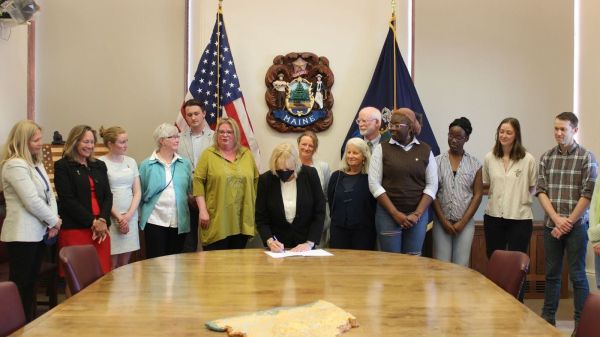Youth Engagement in Advancing Transformational Climate Education Policy

Welcome to our EE and Civic Engagement mini-blog series! This series highlights key insights from a panel discussion hosted by Cornell University and the NAAEE ee360+ program in May 2024. Each post will feature one panelist, sharing their segment of the webinar along with a thoughtful essay that expands on their ideas.
This essay is written by Amara Ifeji, a National Geographic Young Explorer and internationally awarded non-profit leader in climate and environmental justice. As the Director of Policy with the Maine Environmental Education Association, she leverages grassroots advocacy and participatory justice to advance local, state, and federal policy solutions. She served as the lead coordinator for Maine's first Climate Education Summit, mobilized a youth-led movement that spearheaded Maine's $2+ million climate education program, and serves on the Maine Climate Council as the governor-appointed Youth Representative.
As a high school student and budding environmental educator, I led stormwater monitoring efforts with my peers. This community science work enabled me to recognize the significance of education in environmental advocacy. However, I wondered how I would scale my education initiatives to positively impact students beyond my local community. Little did I know that I would soon connect with folks across the state who similarly regarded education as a critical tool for social change, nor that our advocacy efforts would ultimately culminate in the Maine Legislature investing $2+ million in a historic K-12 climate education program.
I joined the Nature Based Education Consortium and its Climate Education Advocacy working group when the pandemic shifted Maine's youth climate movement from in-person rallies to Zoom meetings. Especially during the isolating early months of the pandemic, I was grateful to meet with people across Maine who shared my vision to enhance climate and environmental awareness for Maine students. Our intergenerational, youth-led group of students, educators, and community leaders bonded around a shared background: lacking climate education in our public school experience.
Spending the first few months building trusting relationships fostered a culture of mutual respect and a way of being that values all contributions to collective work. With trust as the foundation of our work, we had the perfect recipe for a legislative campaign in 2021. This included many grassroots, youth-led groups advocating for climate education in Maine schools. This need was underscored by data supporting the need for climate education professional development for teachers, evidenced by educator feedback in the 2021 Maine Climate Education Summit and the 2019 Census for Community-Based Environmental Learning. Furthermore, Maine demonstrated governmental leadership on climate action through the Maine Climate Council. Given this momentum, we conceptualized the campaign for a climate education bill, LD 1902.
Many in our group, including myself, had never attended a public hearing nor testified for a bill. Moreover, the bill initially did not make it through the legislative council process. However, the youth in our group mobilized an effort to overturn this decision, and we were ultimately successful. In Fall 2021, we designed the bill campaign strategy, wrote the bill language, and secured bi-partisan sponsorship. It garnered immense community support with over 100 pieces of positive testimony, and the Maine Environmental Priorities Coalition selected it as a priority legislation. In April 2022, youth networks in Maine mobilized over 100 students, educators, and decision-makers to the Statehouse in Augusta to support the bill. Passed in the Maine House and Senate with a bipartisan vote, this bill was signed into law on May 9, 2022, with $2.1 million to advance climate education in Maine public schools.
Above all else, Maine’s climate education story is one of the successes in centering those most impacted by decisions in solution generation. As those who have never known a world outside of the climate crisis and who will inherit this challenge, youth are critical thought partners in climate solution generation. As such, youth voices were central to policy design and advocacy for this bill. Maine’s story is a critical example of the power of youth engagement in addressing the climate crisis.

